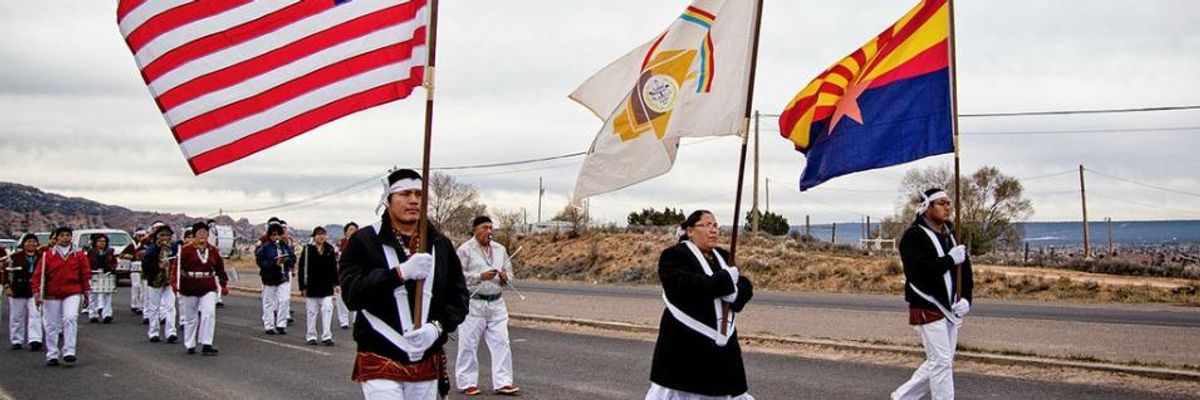It's almost time to count. Since I began my blog around Labor Day about Indian country and elections I've written some 16,000 words, posted 25 column-length essays, and many more Tweets and Facebook posts. It seemed to me that this election is one where Indian country can still shape the outcome.
All we have to do is to "over-represent" or vote in larger numbers than expected. We know that fewer people will vote in mid-term elections, but if Indian country votes in higher numbers, then we have a disproportionate impact on the outcome. I think the odds are good that could happen in at least Alaska, Wisconsin, North Carolina and South Dakota.
Throughout this project and over the course of some three decades of writing, I hear from those who argue that Native Americans should not participate in elections because it's a waiver of sovereignty. As Ray Cook of Indian Country Today Media Network puts it: "To vote as Americans sends a mixed message. If we strive to live a free and independent existence, does voting as Americans surrender that existence? Certainly as governments of real nations it does. After that act of voting do we still remain a sovereign and distinct people, or do we become dark Americans, a minority in a sea of many?"
I respect those who share that philosophical framework. But, for me, I think that voting is the surest route to change. I've seen it happen. Again and again. Take Montana. The increased participation of American Indians is partly why there is an Indian Education for All requirement for students in Montana schools. This is a long-term change because it will help people understand why tribes matter. It makes the case now for the next generation of Montana citizens.
That said: Elections are imperfect. Native people should have far more say over our lives than we do. We should have a voice in the Senate, the House, and even in state governments. The system itself is skewed. In the last election cycle, for example, more Americans voted for Democrats for Congress than Republicans. Yet because of geography and the district system the House was and will be after Tuesday still in Republican hands. Other nations have figured out methods to make their election process more democratic using techniques such as proportional representation. As Malia Villegas, National Congress of American Indians Policy Research Center director, said last month, a proportional system would mean two Native U.S. senators and seven Native members of the House of Representatives.
This much is certain: In a country of 312 million a small slice of white males should not dominate our elected leadership; we need to keep pressing for a representative democracy. Especially in states like Alaska. Alaska Natives are nearly 20 percent of the population (and growing) so it's long past time for a Native voice.
Beyond philosophy there are practical reasons to engage politically. Voters will soon determine control of the U.S. Senate. And if Republicans win, that means the leadership of the Senate Committee on Indian Affairs will shift away from Montana's Jon Tester to Wyoming's John Barrasso. That committee change is not insignificant. It means a new majority staff and distinct policy differences.
Barrasso, for example, wants to limit the power of the EPA. Why? Because the agency recognized the power of the Wind River tribes to write their own Clean Air Act rules as a state, including over a "non-tribal town" or what he called, "territory not authorized by law."
Barrasso also opposed the Affordable Care Act, the Violence Against Women Act, especially tribal jurisdiction over non-Indians. (That fact alone will make it difficult to move a fix to the Alaska exception in the next Congress.)
Of course the way it works is that should the Republicans win Indian country will still find a path to win support on issues where there is agreement. History shows there is always something that can be done no matter who's running Congress (except during the termination era).
Still elections matter. This will be a close election and, I believe, one where the American Indian and Alaska Native vote could produce unexpected results.
But win or lose, this is just the beginning. As this country changes demographically, and becomes more diverse, the country's next chapter cannot be written without Native voices. Tuesday is not just about a single election; it's about what kind of future we can help shape.
Speaking of the future: On Tuesday night I will be live blogging and reporting on Twitter. On Twitter look for the @TrahantReports with the hashtag #NativeElect. I'll also be on Facebook live on the Trahant Reports page. And, as always, new material will be posted on my free app for iPhones and Androids.
Thanks for reading.
